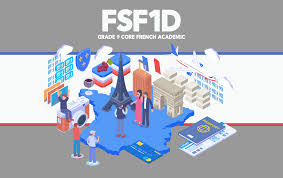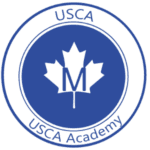FSF1D Course (Core French Grade 9)
Send Us A Message
Comprehensive Overview of FSF1D – French Course Curriculum

Course Code: FSF1D
Course Type: Academic
Credit Value: 1.0
Format: Online School Course
Prerequisite:None
Tuition Fee (CAD): $574
Course Description
This course provides opportunities for students to communicate and interact in French with increasing independence, with a focus on familiar topics related to their daily lives. Students will develop their skills in listening, speaking, reading, and writing by using language learning strategies introduced in the elementary Core French program, and will apply creative and critical thinking skills in various ways. They will also enhance their understanding and appreciation of diverse French-speaking communities, and will develop skills necessary for lifelong language learning.
Outline of Course Content
Unit
Titles and Descriptions
Time and Sequence
Unit 1
Les contes de fées
An introductory unit, students will read, watch and listen to several fairy tales. They will participate in discussions and debates with one another and reflect upon the stories studied.
20 hours
Unit 2
C’est Moi!
In this unit, students will share information about themselves, as well as a friend. Using qualifying adjectives, they will write descriptive paragraphs. Reflexive verbs are studied, and the students will create a Facebook page for a celebrity.
22 hours
Unit 3
Les films
Students will learn about and discuss different movie genres. Students will delve into the horror genre, and create a dialogue between two characters. The passé composé of regular and irregular verbs, personal, direct and indirect object pronouns, as well as the pronouns y and en are studied, in order for students to create a proper email message.
22 hours
Unit 4
La saga du monde vers
After learning the futur simple, students will participate in an online graphic novel study. They will engage in discussions about the story and its characters, and they will maintain a comprehension and reflection journal.
22 hours
Unit 5
Vive le Français!
Students will be exposed to a variety of Francophone cultures around the world, with a particular emphasis on music, celebrations, and travel considerations. They will research and plan a trip to their chosen location, and create a comprehensive oral presentation on their chosen culture.
22 hours
Total
110 hours
French Grade 9 Academic
A1. Listening to Understand:
determine meaning in a variety of authentic and adapted oral French texts, using a range of listening strategies;
A2. Listening to Interact:
interpret messages accurately while interacting in French for a variety of purposes and with diverse audiences;
A3. Intercultural Understanding:
demonstrate an understanding of information in oral French texts about aspects of culture in diverse French-speaking communities and other communities around the world, and of French sociolinguistic conventions used in a variety of situations and communities.
French Grade 9 Academic
B1. Speaking to Communicate:
communicate information and ideas orally in French, using a variety of speaking strategies, appropriate language structures, and language appropriate to the purpose and audience;
B2. Speaking to Interact:
participate in spoken interactions in French for a variety of purposes and with diverse audiences;
B3. Intercultural Understanding:
in their spoken communications, demonstrate an awareness of aspects of culture in diverse French-speaking communities and other communities around the world, and of the appropriate use of French sociolinguistic conventions in a variety of situations.
French Grade 9 Academic
C1. Reading Comprehension:
determine meaning in a variety of authentic and adapted French texts, using a range of reading comprehension strategies;
C2. Purpose, Form, and Style:
identify the purpose(s), characteristics, and aspects of style of a variety of authentic and adapted text forms in French, including fictional, informational, graphic, and media forms;
C3. Intercultural Understanding:
demonstrate an understanding of information in French texts about aspects of culture in diverse French-speaking communities and other communities around the world, and of French sociolinguistic conventions used in a variety of situations and communities.
Students will be involved in a variety of reading, writing, listening and speaking activities. The development of oral communication skills provides the foundation for students to read and write effectively. Students will have opportunities both to listen and to speak French. These include:
|
Socratic Dialogue |
Practice and Drill |
|
Oral Presentation |
Response Journals |
|
Discovery Activity |
Presentations/videos |
|
Homework |
Demonstrations |
| Assessment FOR Learning | Assessment AS Learning | Assessment OF Learning |
|---|---|---|
|
During this process the teacher seeks information from the students in order to decide where the learners are and where they need to go. |
During this process the teacher fosters the capacity of the students and establishes individual goals for success with each one of them. |
During this process the teacher reports student’s results in accordance to established criteria to inform how well students are learning. |
| Conversation | Conversation | Conversation |
|
Classroom discussion Self-evaluation Peer assessment |
Classroom discussion Small group discussion Post-lab conferences | Presentations of research Debates |
| Observation | Observation | Observation |
| Drama workshops (taking direction) Steps in problem solving | Group discussions | Presentations Group Presentations |
| Student Products | Student Products | Student Products |
| Reflection journals (to be kept throughout the duration of the course) Check Lists Success Criteria |
Practice sheets Socrative quizzes |
Projects Poster presentations Tests In Class Presentations |
Some of the approaches to teaching/learning include
|
Strategy |
Who |
Assessment Tool |
|
Assignments |
teacher |
rubric or marking scheme |
|
Oral Presentations |
self/peer or teacher |
rubric |
|
Work & Task Sheets |
self /peer or teacher |
checklist or rubric or marking scheme |
|
Textbook Use |
self or teacher |
checklist |
|
Teacher Led Review |
self/peer or teacher |
checklist |
|
Performance Task |
self/peer or teacher |
rubric |
|
Written Quiz |
teacher |
marking scheme |
|
Written Test |
teacher |
marking scheme |
|
Performance Task |
teacher |
rubric or marking scheme |
|
Final Written Exam |
teacher |
marking scheme. |
French Grade 9 Academic: The evaluation of this course is based on the four Ministry of Education achievement categories of knowledge and understanding (25%), thinking/inquiry (25%), communication (25%), and application (25%). The evaluation for this course is based on the student’s achievement of curriculum expectations and the demonstrated skills required for effective learning.
The percentage grade represents the quality of the student’s overall achievement of the expectations for the course and reflects the corresponding level of achievement as described in the achievement chart for the discipline.
A credit is granted and recorded for this course if the student’s grade is 50% or higher. The final grade for this course will be determined as follows:
- 70% of the grade will be based upon evaluations conducted throughout the course. This portion of the grade will reflect the student’s most consistent level of achievement throughout the course, although special consideration will be given to more recent evidence of
- 30% of the grade will be based on a final exam administered at the end of the The exam will contain a summary of information from the course and will consist of well-formulated multiple-choice questions. These will be evaluated using a checklist.
Textbook and Resources
- Sans frontières 9e, Catenacci et al., Pearson Education Canada, 2000
- https://groupemediatfo.org/
- Je suis capable! (French) Paperback – Apr 1 2013 by Dominique Pelletier.com
Frequently Asked Questions (FAQ)
Students will enhance their listening, speaking, reading, and writing skills in French, with a focus on creative and critical thinking.
Topics include fairy tales, personal descriptions, movie genres, graphic novels, and Francophone cultures worldwide.
No, this course does not require any prerequisites.
70% is based on evaluations throughout the course, and 30% is based on a final exam.
Strategies include Socratic dialogue, oral presentations, response journals, and discovery activities.
